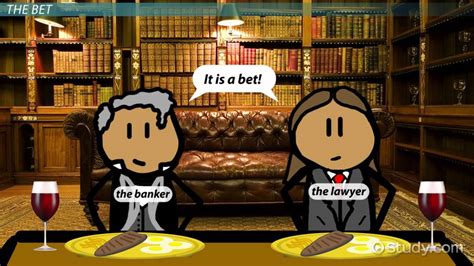moral of the story the bet 24/01/2025,tim story Wikipedia,moral of the story the bet,In The Bet by Anton Chekhov we have the theme of morality, integrity, isolation, materialism, change and desperation. Taken from his Collected Short Stories collection the story is deluxe guestroom Relax in a nostalgic, hip, and comfortable setting with superb amenities. book now executive guestroom Relax in style amid a spacious contemporary . See more

Introduction:
In Anton Chekhov's "The Bet," the story explores themes of materialism, spiritual freedom, and the futility of earthly pursuits. The narrative contrasts the lawyer, who gains wisdom and...
"The Bet," written by Anton Chekhov, is a thought-provoking short story that delves into the profound psychological effects of isolation and confinement on the human mind. This captivating narrative explores the journey of a prisoner who willingly subjects himself to fifteen years of solitary confinement in exchange for a large sum of money. Through vividly depicting the prisoner's struggles, Chekhov highlights the moral implications and profound consequences of such extreme isolation. This article will delve into the moral of the story, analyzing the psychological aspects and lessons we can derive from "The Bet."
1. The Power of Loneliness and Isolation:
The prisoner in "The Bet" initially grapples with the overwhelming sense of loneliness and isolation that comes with being confined to a single room for fifteen years. As time passes, the prisoner's mental state deteriorates, demonstrating the detrimental impact of prolonged isolation on the human psyche. This aspect of the story serves as a cautionary tale, reminding readers of the importance of human connection and the dangers of extreme solitude.
2. The Insatiable Human Desire for Freedom:
Throughout the story, the prisoner experiences a shift in his perspective on life. He begins to realize that the wealth he had initially coveted is meaningless in the absence of freedom. The story highlights the innate human desire for liberty and the idea that material possessions cannot replace the fundamental need for autonomy. This moral lesson urges readers to reassess their priorities and value personal freedom above materialistic pursuits.
3. The Illusion of Time:
As the prisoner spends years confined to his room, time becomes an abstract concept. The story raises questions about the subjective nature of time and how our perception of it can be distorted under certain circumstances. This aspect of "The Bet" prompts readers to reflect on the fleeting nature of life and the importance of making the most of every moment.
4. The Evolving Nature of Knowledge:
During his confinement, the prisoner immerses himself in books, devouring knowledge from various fields. However, as time progresses, he begins to question the true value of this accumulation of knowledge. The story encourages readers to consider the purpose of knowledge and the significance of applying it for the betterment of society rather than merely accumulating it for personal gain.
5. The Paradox of Punishment:
Throughout the story, the concept of punishment is explored, with the prisoner's self-imposed isolation serving as a form of punishment for his actions. "The Bet" raises questions about the effectiveness and morality of punitive measures. It challenges readers to contemplate whether isolation and confinement truly lead to redemption or if alternative methods should be pursued for the rehabilitation of individuals.
"The Bet" by Anton Chekhov explores the tension between materialism and the value of human life, setting up a clash of ideals between two men—one who believes that life, …

moral of the story the bet 24/01/2025 Araw-araw Pasko sa S5, pero hindi mo pa binubuksan yung first pamasko mo! .
moral of the story the bet - tim story Wikipedia